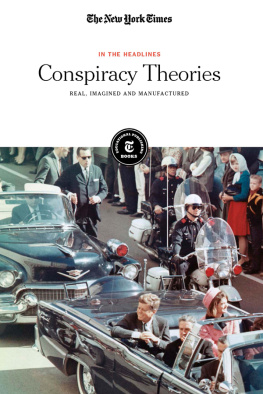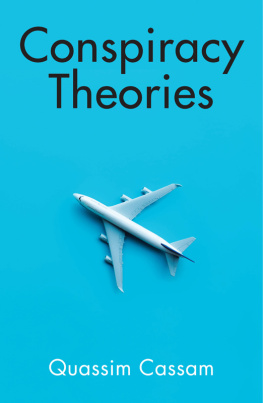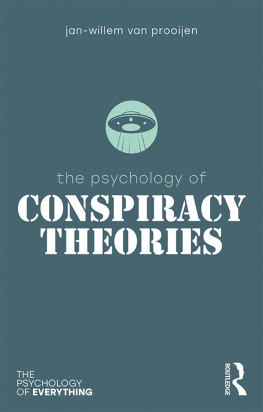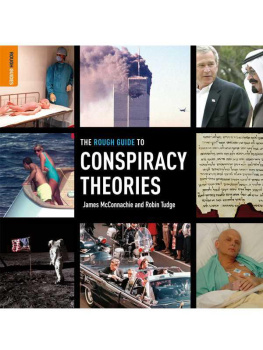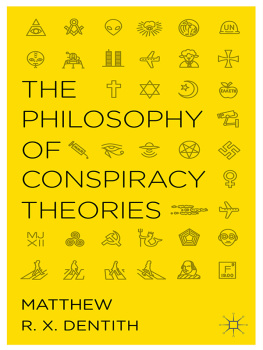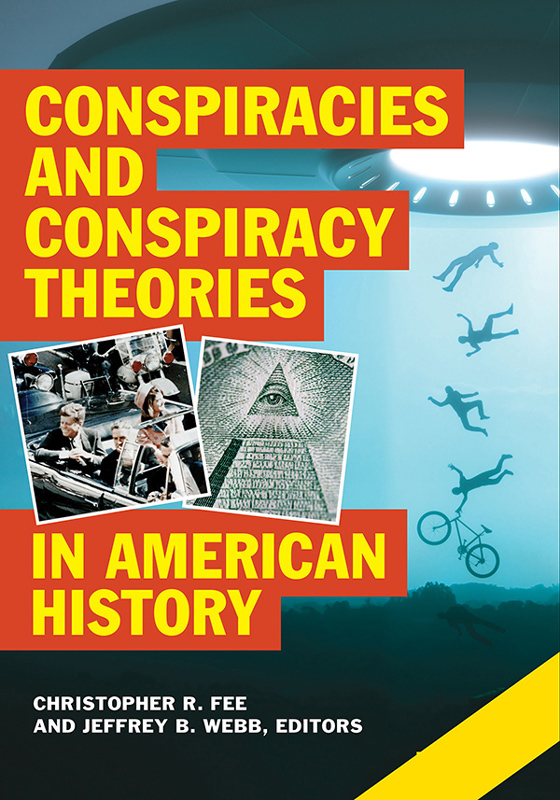Conspiracies and Conspiracy Theories in American History
Copyright 2019 by ABC-CLIO, LLC
All rights reserved. No part of this publication may be reproduced, stored in a retrieval system, or transmitted, in any form or by any means, electronic, mechanical, photocopying, recording, or otherwise, except for the inclusion of brief quotations in a review, without prior permission in writing from the publisher.
Library of Congress Cataloging-in-Publication Data
Names: Fee, Christopher R., editor. | Webb, Jeffrey B., editor.
Title: Conspiracies and conspiracy theories in American history / Christopher R. Fee and Jeffrey B. Webb, editors.
Description: Santa Barbara, CA : ABC-CLIO, [2019] | Includes bibliographical references and index.
Identifiers: LCCN 2018047364 (print) | LCCN 2018051478 (ebook) | ISBN 9781440858116 (ebook) | ISBN 9781440858109 (set) | ISBN 9781440858123 (volume 1) | ISBN 9781440858130 (volume 2)
Subjects: LCSH: Conspiracy theoriesUnited StatesHistory. | United StatesHistory.
Classification: LCC E179 (ebook) | LCC E179.C6556 2019 (print) | DDC 973dc23
LC record available at https://lccn.loc.gov/2018047364
ISBN: 978-1-4408-5810-9 (set)
978-1-4408-5812-3 (vol. 1)
978-1-4408-5813-0 (vol. 2)
978-1-4408-5811-6 (ebook)
23 22 21 20 19 1 2 3 4 5
This book is also available as an eBook.
ABC-CLIO
An Imprint of ABC-CLIO, LLC
ABC-CLIO, LLC
147 Castilian Drive
Santa Barbara, California 93117
www.abc-clio.com
This book is printed on acid-free paper 
Manufactured in the United States of America
Contents
Business and Financial
Military and Intelligence
Political
Popular Culture
Science and Technology
Social
Surrounded by Conspiracies
The terms of conspiracy and conspiracy theory are familiar as any in the English language: Area 51, the Manchurian Candidate, and the Grassy Knoll. This speaks directly to the ubiquity of conspiracy and conspiracy theory in modern American culture. Yet conspiracies are as ancient as human civilization itself, since a conspiracy is, by law, a combination or confederacy between two or more persons formed for the purpose of committing by their joint efforts, some unlawful or criminal act (Pipes 1997, 20). Even so, conspiracy theories have reached a position of real, measurable cultural significance. They are the subject of major academic books, scholarly journals, and professional conferences, all seeking to explain their function within contemporary culture and their power over the popular imagination. The entertainment industry has capitalized on this popular obsession and flooded screens with conspiracy-themed movies and TV shows too numerous to count.
In the westernized, developed nations, people are fascinated by the idea that their politicians, businessmen, scientists, journalists, and other intellectual and social elites are working together in secret to control peoples lives and unfairly profit from economic and political systems. History shows that conspiracies to commit crimes or to secure political objectives do indeed occur from time to time. Some have been exposed, either by investigative journalists or by criminal investigators, while others have remained undetected. Inspired by these real-world instances, conspiracy theorists have conjectured even darker, more elaborate, and farther-reaching designs to conceal political corruption, exert government control, or manipulate the economy.
The increased size of corporate bureaucracies and the proliferation of government agencies encourage rank speculation about whats going on behind closed doors, especially given the mission of some of these agencies to secretly gather intelligence or engage in various cloak-and-dagger operations. In the absence of disclosure, transparency, and oversight, corporate and political elites dominate popular accounts of treachery and schemes of world domination. Sometimes these accounts end up in the mainstream news media, but they are more likely to be found on alternative news sources, such as the Web site Educate-yourself.org and the radio program Coast to Coast AM. The Internet and radio didnt invent conspiracy theory obsession, but they have done their share to promote it.
In many cases, conspiracy theories reveal the worst sentiments in the human mind, including religious bigotry, racial prejudice, anti-intellectualism, and class resentment. These attitudes are packaged inside conspiracy narratives and announced as factualwith corresponding derision for anyone who may doubt their truthfulness. Catholics, Jews, Freemasons, atheists, and a wide variety of racial minoritiesto name just a feware targeted by theorists aiming to expose their true intent, defined broadly as undermining democracy and destroying the fabric of American society.
Throughout American history, actual conspiracies and far-fetched conspiracy theories have worked hand in glove to produce a deep-seated, reflexive paranoia that pulses just below the surface of American public life. In times of great popular anxiety or even national crisis, conspiracy theories break out like a rash and affect the dynamics of political discourse and even the outcomes of the electoral process. What might have been true in 1776, 1861, or 1954 is no less true in the era of Barack Obama, Hillary Clinton, and Donald Trump.
Tracking Conspiracies through American History
In the colonial world, British Americans recounted stories about Catholic plots against the Protestant succession of English monarchs, particularly the so-called Jacobite risings of 1715 and 1745. These plots formed the backdrop of anti-Catholic conspiracy theories in early America. Leaders of the American resistance movement against Parliamentary taxation and imperial reform in the 1760s and 1770s claimed that King George IIIs ministers in London intended to eviscerate their colonial charters (with their grants of self-government) and impose a tyranny over the American provinces. Thomas Jeffersons Summary View of the Rights of British America (1774) borrowed from English essayists, writers known as the Real Whigs, the notion that evil, corrupt ministers of the king were secretly conspiring to deprive Englishmen of their natural rights and liberties.
Jefferson wrote, Single acts of tyranny may be ascribed to the accidental opinion of a day; but a series of oppressions, begun at a distinguished period, and pursued unalterably through every change of ministers, too plainly prove a deliberate and systematical plan of reducing us to slavery (Jefferson 1774, 11). The sequence of measures from the Proclamation of 1763, to the Sugar and Stamp Acts, to the Townshend Acts, to the Intolerable Acts convinced Jefferson and other patriots that the kings ministers conspired to monopolize the wealth of the colonies and undermine their political autonomy. According to Thomas Paines Common Sense (1776), published after the battles of Lexington and Concord and the Battle of Bunker Hill, royal officials had a consistentif secretagenda from generation to generation: The same tyranny which drove the first emigrants from home, pursues their descendants still (Paine 1776, 36).
Thus was born one of the key conspiracy theories in American history, an idea enshrined in the very language of the Declaration of Independence. The drafting committee, led by Jefferson, depicted the various policies of George III as having in direct object the establishment of an absolute Tyranny over these States. The Declaration highlighted the kings use of mercenaries, slave rebellions, and naval raids on coastal towns as evidence, so for contemporary readers of the document it was not difficult to visualize the harm that George III and his ministers intended to inflict upon them. The War of Independence progressed against the backdrop of fears that powerful men like Lord Grenville and Lord North, whom the colonists could petition but were otherwise powerless to constrain, sustained an intentional campaign to control the lives of ordinary Americans for the benefit of an unaccountable political and economic elite.

![Christopher R. Fee Conspiracies and Conspiracy Theories in American History [2 Volumes]](/uploads/posts/book/429085/thumbs/christopher-r-fee-conspiracies-and-conspiracy.jpg)

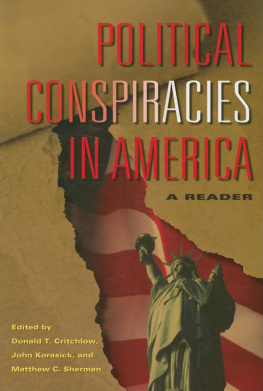
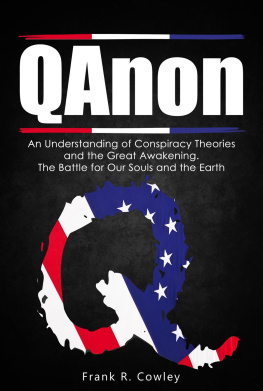
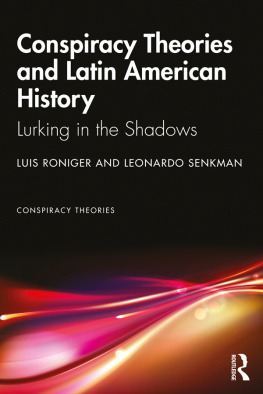
![Monte Cook - The Skeptics Guide to Conspiracies: From the Knights Templar to the JFK Assassination: Uncovering the [Real] Truth Behind the Worlds Most Controversial Conspiracy Theories](/uploads/posts/book/346601/thumbs/monte-cook-the-skeptic-s-guide-to-conspiracies.jpg)
